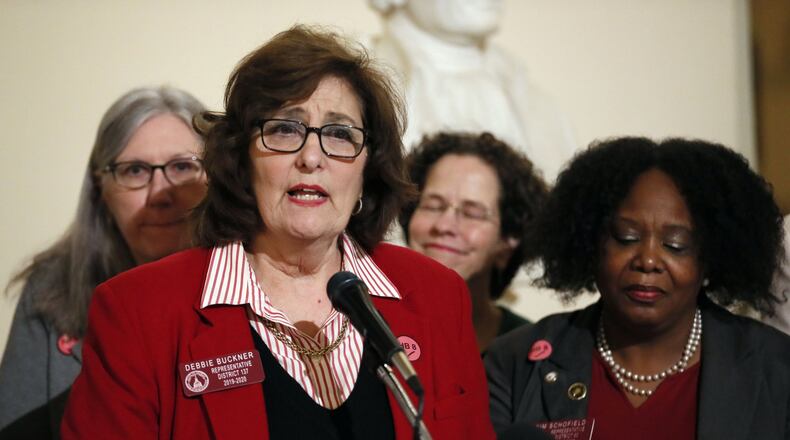Citing policy victories at the Georgia Emergency Management Agency and the Department of Corrections, a group of lawmakers is pushing to remove the 4 percent tax that women and girls pay when buying menstrual products.
GEMA Director Homer Bryson said that after speaking with lawmakers last year during Hurricane Michael, the agency began providing menstrual products to women who are receiving aid from the state.
At the state’s prisons, Corrections Commissioner Timothy C. Ward put a policy in place that provides the menstrual products to incarcerated women.
Several Democratic lawmakers and women’s rights organizations gathered at the Capitol on Tuesday to tout the changes but said there is more to be done.
State Rep. Debbie Buckner, a Junction City Democrat, said women are unfairly taxed when buying tampons and other menstrual items — products classified by the U.S. Food and Drug Administration as medical devices. She has pointed out there is no equivalent product for men.
“While I realize, and have heard from several people, that this topic is uncomfortable to talk about, we must realize that in Georgia meeting basic human needs and treating people with dignity and respect is the only way that we can be the best Georgia we can be,” Buckner said.
Buckner said she thinks taxing menstrual products has been an oversight, and she introduced House Bill 8 to rectify things. Georgia waives the tax on other nonprescription medical devices, such as diabetic test strips and insulin syringes.
Ten states have abolished similar taxes.
According to a fiscal note from the state Department of Audits and Accounts, waiving the tax on menstrual products would decrease the state’s revenue by about $9 million in 2020. Georgia’s budget for fiscal 2019 was $26.2 billion.
The department estimated that women and girls between the ages of 10 and 54 spend about $63 each year on menstrual products.
Buckner introduced a similar bill last year, but it went nowhere.
Claire Cox with Georgia STOMP, a coalition of women’s groups pushing to repeal the tax on menstrual products, said the policy changes made at GEMA and in the state prisons give her hope the bill will pass this year.
“I’m happy to see people have an open attitude to meeting the basic needs of women in this state,” Cox said.
Stay on top of what's happening in Georgia government and politics at ajc.com/news/georgia-government/.
About the Author
Keep Reading
The Latest
Featured





